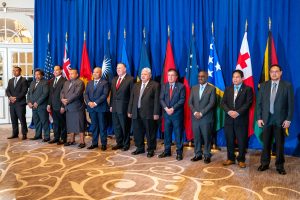The trajectory of Pacific-U.S. relations will largely hinge on how the new administration navigates its climate policies. Unfortunately, President-elect Donald Trump has already called climate change “one of the great scams” and “a big hoax.” Trump has vowed to remove the United States from the Paris Agreement again and scrap regulations intended to cut carbon emissions. The Republican platform also states its first priority will be to “unleash energy production from all sources,” including nuclear power, to bring down cost of living pressures and inflation.
The Trump administration’s posture on climate change puts him at loggerheads with Pacific Islanders, who have only just re-established positive rapport with the United States after years of neglect. The Pacific Island community considers climate change a matter of national security. The Pacific Island Forum’s 2018 Boe Declaration on Regional Security expanded the concept of security, with climate change representing “the single greatest threat to the livelihoods, security and wellbeing of the peoples of the Pacific.” Republican plans to double-down on nuclear energy will likely deeply disturb Pacific Island countries, many of which are still dealing with the consequences of large-scale U.S. nuclear testing in the Pacific after World War II.
Since 2020, the Pacific Islands region has seen significantly more U.S. engagement in response to China’s growing influence. The United States established new embassies in the Solomon Islands, Tonga, and Vanuatu, and plans to open an embassy in Kiribati and appoint a resident ambassador to Samoa. In 2022 and 2023, President Joe Biden hosted Pacific leaders for the U.S.-Pacific Islands Forum Leaders’ Summit. The United States also expanded programming for the region to support managing fisheries and combating illegal, unreported, and unregulated fishing, and signed a new defense cooperation agreement with Papua New Guinea.
The Biden administration’s pivot to the Pacific had climate-related issues at its core. In 2022, Biden launched the United States’ first ever Pacific Partnership Strategy, which committed Washington. to work with Pacific Islands to “combat the climate crisis.” The strategy launched a series of initiatives worth over $810 million in new funding, including to help Pacific Islands adapt to and manage the impacts of climate change. In 2023, the United States signed agreements with the Freely Associated States of the Republic of Palau, the Republic of the Marshall Islands, and the Federated States of Micronesia (FSM) extending economic assistance for a further 20 years, including greater support for the environment and climate change adaptation.
The United States is likely to stay actively engaged in the region under a Trump presidency, but the focus of engagement will look different. The previous Trump administration placed significant emphasis on Pacific security, establishing a Pacific Islands directorship in the National Security Council. During his first term as president, Trump also hosted leaders from the Freely Associated States at the White House. Meanwhile, members of his Cabinet, including then-Vice-President Mike Pence and then-Secretary of State Mike Pompeo, visited several Pacific Island states, including FSM and Papua New Guinea, to reinforce security ties.
Republicans are fully aware of the great power competition underway in the Pacific. Trump’s appointment of Mike Waltz as national security adviser is likely to mean even stronger security engagement in the Pacific Islands, by shining the light on the United States’ discontent with China’s growing influence in the region. Waltz has already indicated his preference to pivot from the conflicts in Ukraine and the Middle East to “countering the greater threat from the [Chinese] Communist Party.” The Heritage Foundation, a Republican-aligned think tank, stated that the region remained “worthy of increased U.S. engagement and resource allocation” to protect U.S. interests and further prevent China from gaining a foothold in the region.
Given this new focus, how the United States directs funding to the Pacific may change. Total U.S. development assistance to the region increased from $26.4 million in fiscal year 2020 to $56.7 million in fiscal year 2023, according to the U.S. Agency for International Development (USAID). While the USAID budget to the Pacific increased under Biden, this is not guaranteed under Trump. This could affect several impending pieces of legislation currently before Congress, including the Blue Pacific Act (HR 4538). Introduced to Congress in November 2023, the act would authorize the U.S. to initiate a range of measures to respond to natural disaster preparedness, climate resilient infrastructure, sea level rise, and oceans management.
However, we should not underestimate the power of the Pacific Island states in leveraging larger countries, even the United States, to achieve their own domestic policy goals. The Pacific Islands cover 15 percent of the world’s surface and are located strategically in between the U.S., China and Australia. The U.S. needs Pacific Island states onside if it wants to win the battle against China’s growing influence in the region, and Pacific Island nations know this. For this reason, we can expect the incoming Trump administration to remain actively engaged in the Pacific and even potentially bend to the will of the Pacific Islands on climate-related measures. The degree to which the United States and Pacific Islands can make the next four years mutually beneficial will depend on the flexibility of both sides.

































